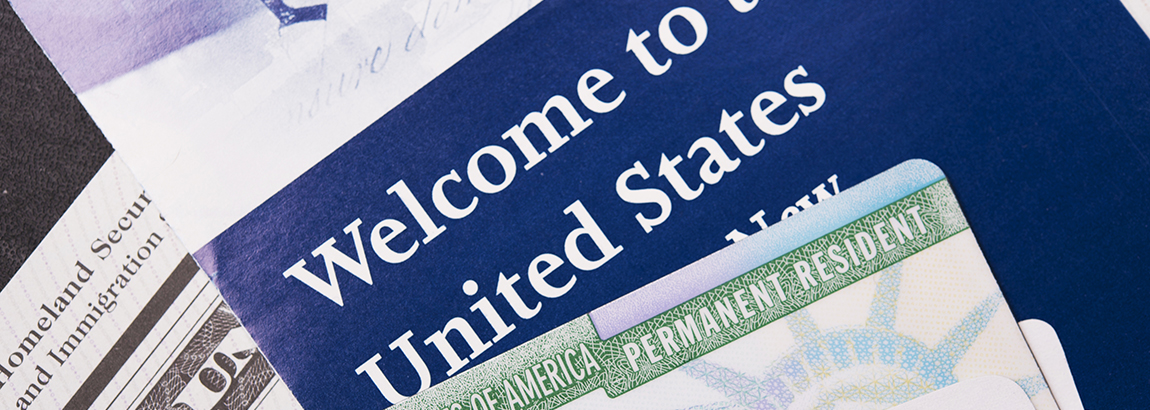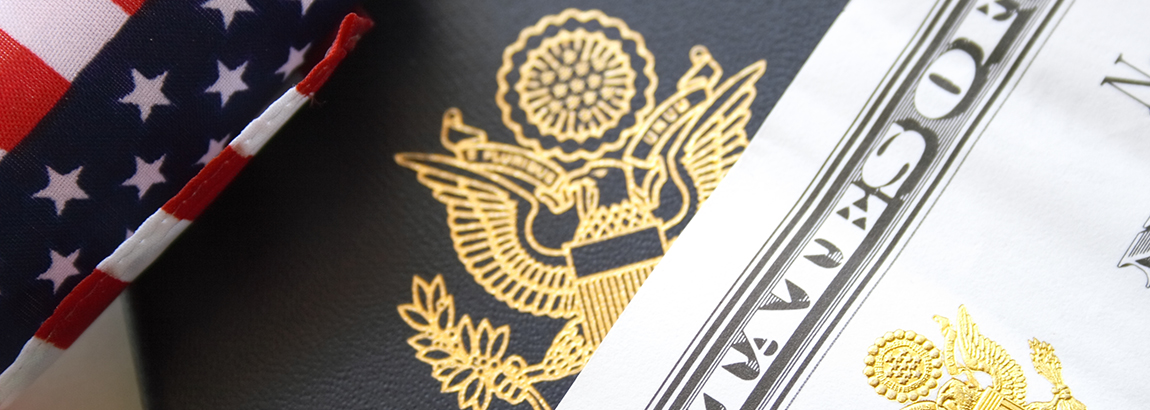Kolko & Casey, P.C. is a full service immigration and naturalization law firm providing professional legal services to individuals and businesses throughout Colorado, the Rocky Mountain West, the United States, and the World. Our professional staff speaks English, Spanish, Korean, and Portuguese and we can arrange for translators in any other language.
Temporary Visas for Athletes & Entertainers
P - Internationally Recognized Athletes, Athletic Teams and Entertainers
The P-1 classification applies to people who are coming to the U.S. temporarily to perform at a specific athletic competition as an athlete, individually or as part of a group or team, at an internationally recognized level of performance.
P-1A: Internationally Recognized Athlete
People eligible for a P-1A Visa must be coming to the United States to participate in an individual event, competition or performance in which they are internationally recognized with a high level of achievement, as evidenced by a degree of skill and recognition substantially above that ordinarily encountered so that the achievement is renowned, leading or well known in more than one country.
In order to establish eligibility for a P-1A, an athlete must show at least two (2) of the following:
- Significant participation in a prior U.S. major league season;
- Participation in international competition with a national team;
- Significant participation in a prior U.S. intercollegiate competition season;
- Written statement from official of sport’s governing body;
- Written statement from sports media or recognized expert;
- International ranking; or
- Significant honors/awards in the sport.
P-1B: A Member of an Internationally Recognized Entertainment Group
The P-1B visa classification applies to people who are coming to the United States temporarily to perform as a member of an entertainment group that has been recognized internationally as outstanding in the discipline for a sustained and substantial period of time.
The entertainment group must be internationally recognized, having a high level of achievement in a field evidenced by a degree of skill and recognition substantially above that ordinarily encountered. The reputation of the group, not the individual achievements of its members or the acclaim of a particular production, is essential. Individual entertainers not performing as part of a group are not eligible for this visa classification. In order to establish eligibility for the P-1B category, the entertainment group must provide evidence of either the group’s nomination for or receipt of significant international awards or at least three (3) of the following:
- Starring or leading entertainment group in productions with distinguished reputations;
- International recognition or acclaim for outstanding achievements;
- Leading or starring group for organizations with distinguished reputations;
- Record of major commercial or critically acclaimed successes;
- Significant recognition for achievements; or
- High salary.
P-2: Individual Performer or Part of a Group Entering to Perform Under a Reciprocal Exchange Program
The P-2 classification applies to foreign nationals who are coming temporarily to perform as an artist or entertainer, individually or as part of a group, and who will perform under a reciprocal exchange program between a U.S. organization and foreign organization. Those entering on P-2 must be artists entering the United States through a government recognized reciprocal exchange program. In addition, P-2 foreign nationals must possess skills comparable to those of the United States artists and entertainers taking part in the program outside the United States.
P-3: Artist or Entertainer Coming to Be Part of a Culturally Unique Program
The P-3 classification applies to those who come to the United States temporarily to perform, teach or coach as artists or entertainers, individually or as part of a group, under a culturally unique program. For a P-3 visa, the foreign national must be coming to the United States either individually or as a group for the purpose of developing, interpreting, representing, coaching, or teaching a unique or traditional ethnic, folk, cultural, musical, theatrical, or artistic performance or presentation. In addition, the foreign national must be coming to the United States to participate in a cultural event or events which will further the understanding or development of the specific art form. The program may be of a commercial or noncommercial nature.
Students Temporary Visas
F-1 Academic Student Visa:
The F-1 Visa is a widely used category and allows you to enter the United States as a full-time student at an accredited college, university, seminary, conservatory, academic high school, elementary school, or other academic institution or in a language training program.
To qualify to receive an F-1 Visa or F-1 Status in the USA, you must plan to be enrolled in a program or course of study that culminates in a degree, diploma, or certificate and your school must be authorized by the U.S. government to accept international students.
Prospective Students are required to coordinate with the school (International Student Advisor) to meet the enrollment requirements and demonstrate ability to pay for the education program and living expenses. Qualified Students (and family) will receive a Form I-20 that allows them to apply for the F-1 Student Visa.
F visa holders may only work on a limited basis on campus. With specific authorization, students may engage in practical training in an off-campus setting during their studies or for one year after completion. Certain STEM (Science, Technology, Engineering, Math) degree programs can receive longer periods of practical training approval in the USA.
Students engaged in practical training must ensure that they have the proper work authorization from their advisor and in most cases, must receive an approved Employment Authorization Document (EAD), otherwise known as a work card.
Student Programs in the USA are now administered through a program called SEVIS, and a list of approved SEVIS Institutions is available at: http://www.ice.gov/sevis/students/
M-1 Vocational Student Visa:
The M-1 visa is another program offered to students who wish to pursue full-time study at a United States Citizenship and Immigration Services approved vocational or non-academic school in the United States.
These schools are usually community and junior colleges that offer vocational and technical training or vocational high schools. This visa category includes students in vocational or other nonacademic programs, other than language training.
J-1 Exchange Visitors:
The J-1 visa category is designed to provide educational and cultural exchange programs, and to promote the sharing of individuals, knowledge and skills in education, arts and sciences.
J-1 Exchange Visitor Visas are available for a broad range of uses and may be available to employer or those who intend to participate in an approved program for the purpose of teaching, instructing or lecturing, studying, observing, conducting research, consulting, demonstrating special skills, receiving training, or to receive graduate medical education or training.
J-1 Exchange Visitors should be aware that there is often a two-year home residency requirement for participants in the J-1 Exchange program. This residency requirement provides that certain J-1 Exchange Visitors are required to return to their home country after completing their J-1 Exchange Program for a period of at least two years, before being eligible to receive another visa to return to the United States.
Employers/Businesses Temporary Visas
H-1B Specialty Occupation
The H-1B is a nonimmigrant classification allowing U.S. employers to seek temporary employment authorization for certain professional foreign workers to work for the U.S. employer in a specialty occupation. The position in which the foreign worker will be employed must meet the definition of “specialty occupation” (i.e., require a minimum of a bachelor’s degree or its foreign equivalent to perform the job duties). Additionally, the foreign worker must have a U.S. Bachelor’s Degree or its foreign equivalent in a relevant field and be otherwise qualified to perform the job duties of the specialty occupation position.
An H-1B petition can be approved for up to three years, and extended for an additional three years for a maximum of six years. Extensions beyond the six year limit may be possible for certain employees who have also been sponsored by their employer for lawful permanent residence.
H-1B Cap Cases
There is an annual limit on the number of H-1B visas that can be approved each Fiscal Year (FY) of 65,000 for foreign nationals with a Bachelor’s Degree, and an additional 20,000 for foreign nationals with a U.S. Master’s Degree. This is known as the “H-1B Cap.”
If accepted and approved, cases submitted under the H-1B Cap will authorize employment of the foreign national beginning on the first day of the Fiscal Year (October 1). The U.S. Citizenship & Immigration Service accepts H-1B petitions six (6) months in advance of the beginning of the next fiscal year. This means that each year on April 1, U.S. employers scramble to file petitions on behalf of professional foreign national workers. In most recent years the demand for H-1B visa numbers has far exceeded the number of available H-1B visas. As a result, the USCIS has received many more petitions than available visas during the first week of April. The USCIS then conducts a random lottery of submitted petitions. Petitions that are selected under the lottery are reviewed and adjudicated; rejected petitions are returned to the petitioning employers.
H-1B Cap Exemptions
There are a limited number of employers and employees that are exempt from the H-1B cap. These organizations include:
- Institutions of higher education
- Non-profit entities related or affiliated with an institution of higher education
- Non-profit Research Organizations, and
- Governmental Research Organizations
Employers falling within one of the categories listed above are not subject to the annual H-1B Cap and may file an H-1B petition on behalf of a specialized worker at any time of year. In addition, certain employees may also be exempt from the H-1B cap. These employees include:
- Employees extending or transferring an H-1B petition that has previously been counted under the H-1B Cap
- Employees counted under the H-1B Cap within the preceding 6 years
- Employees who have received “Conrad 30” J-1 Waiver
H-4 Status for Spouses and Children of H-1B Foreign Workers
The spouse and children of an H-1B foreign worker may be able to reside in the United States in H-4 status. However, most spouses and children in H-4 status are not authorized for employment in the United States. In May of 2015, certain H-4 spouses became eligible to apply for employment authorization. In order to qualify, the H-4 spouse must be in the United States and their H-1B spouse must also be the beneficiary of an approved I-140 (Immigration Visa Petition) filed by their employer.
Children on H-4 are eligible to attend school in the United States.
H-2A Temporary Agricultural Workers
The H-2A program allows U.S. employers to bring foreign nationals to the United States to fill temporary agricultural jobs for which U.S. workers are not available. H-2A nonimmigrant classification applies to aliens seeking to perform agricultural labor or services of a temporary or seasonal nature in the United States on a temporary basis.
H-2B Temporary Non-Agricultural Workers
The H-2B non-agricultural temporary worker program allows U.S. employers to bring foreign nationals to the United States to fill temporary nonagricultural jobs. H-2B visas are issued to foreign nationals to work temporarily in jobs for which employers can prove a shortage of qualified American workers.
L-1 Intra-Company Transferees
The L-1 visa and status permits U.S. companies with foreign parents, subsidiaries or affiliates to transfer needed employees from the foreign company to their U.S. facilities.
In order to qualify, two basic thresholds must be met. First, the foreign entity and the U.S. entity must have a qualifying parent, subsidiary, or affiliate relationship. Second, the foreign national worker must have been employed for the foreign entity for at least one continuous year during the past three (3) years.
L-1A: Executive or Manager
The L-1A intra-company transferee visa and status is for individuals coming to the United States to serve in an executives or managerial role for the U.S. company. This classification also enables a foreign company which does not yet have a U.S. office to send an executive or manager to the United States with the purpose of establishing a new office.
A qualified L-1A executive or manager can hold L-1A status for up to seven (7) years.
L-1B: Employee with Specialized Knowledge
The L-1B classification permits a U.S. employer to bring on an employee with specialized knowledge in the company product and its application in international markets or advanced knowledge in processes and procedures of the company.
A qualified L-1B specialized knowledge employee can hold L-1B status for up to five (5) years.
Spouses and children of L-1 Intra-Company Transferees may be eligible to reside in the United States in L-2 status. Spouses in L-2 status are eligible to apply for an employment authorization document (EAD) in order to work in the United States. Children on L-2 status are eligible to attend school in the United States.
O-1 Foreign Nationals with Extraordinary Ability
The O-1 visa and status is a nonimmigrant classification allowing U.S. employers to seek temporary employment authorization for foreign nationals who have demonstrated extraordinary ability in science, education, business, athletics, arts and entertainment. The O-1 is also available to bring certain foreign nationals who have a demonstrated record of extraordinary achievement in the motion picture of television industry to the United States.
O-1A: Extraordinary ability in science, education, business or athletics
Employers seeking to sponsor foreign nationals with extraordinary ability in science, education, business or athletics must demonstrate that the foreign national has a level of expertise indicating that he or she is one of the small percentage of people who has risen to the very top of the field. The foreign national’s extraordinary ability can be evidenced by either the receipt of a significant national or international award or prize, or evidence that the foreign national meets at least three (3) of the following criteria:
- Receipt of nationally or internationally recognized prizes/awards for excellence in the field;
- Membership in associations in the field that require outstanding achievement of their members, as judged by recognized national or international experts;
- Published material in professional or major trade publications or major media about the foreign national;
- Participation on a panel or as a judge of the work of others in the same or an allied field of specialization;
- Original scientific, scholarly, or business-related contributions of major significance;
- Authorship of scholarly articles in professional journals or other major media;
- Current or previous employment in a critical or essential capacity for organizations and establishments that have a distinguished reputation; or
- Past or proffered high salary or other remuneration for services, evidenced by contracts or other reliable evidence.
O-1B: Extraordinary ability in the arts
Employers seeking to sponsor foreign nationals with extraordinary ability in arts, (including, but not limited to, performing arts, culinary arts, visual arts or fine arts) must demonstrate that the foreign national has a level of international or national distinction, prominence or renown.
The foreign national’s distinction or prominence cane be evidenced by either the receipt of a significant national or international award or prize, or evidence that the foreign national meets at least three (3) of the following criteria:
- Has performed/will perform services as a lead/starring participant in productions/events with distinguished reputations as shown by critical reviews, ads, publicity releases, publications, contracts, or endorsements;
- National or international recognition for achievements through critical reviews, other published materials by or about the beneficiary in major papers, trade journals, magazines, etc.;
- Has performed in a lead, starring, or critical role for organizations and establishments that have a distinguished reputation evidenced by media articles, testimonials, etc.;
- Has a record of major commercial or critically acclaimed success;
- Has achieved significant recognition from organizations, critics, government agencies, recognized experts;
- Has commanded or will command a high salary or other remuneration in relation to others in the field.
Foreign nationals intending to travel to the United States temporarily to assist with the O-1B principal’s performance may be able to receive an O-2 visa and status if the petition is filed in conjunction with the O-1B petition filed on behalf of the foreign national with extraordinary ability in the arts.
An initial petition of O-1 status may be approved for up to three (3) years. Although the O-1 visa and status is for a temporary period of time, there is no maximum period of time during which an individual may be in the United States in O-1 status.
Spouses and children of O-1 Extraordinary Aliens may be eligible to reside in the United States in O-3 status. Family members in O-3 status are not eligible for employment authorization in the United States. Children on O-3 status are eligible to attend school in the United States.
Treaty National (TN)
The North American Free Trade Agreement (NAFTA) created special economic and trade relationships for the United States, Canada and Mexico.
The Treaty National (TN) nonimmigrant classification allows U.S. employers to seek temporary employment authorization for certain professional Canadian or Mexican workers to work for the U.S. employer in a designated professional position. TN status is only available to citizens of Canada and Mexico.
The position in which the foreign worker will be employed must meet the definition of “NAFTA Professional” and the foreign worker must be qualified to perform the job duties of the NAFTA position.
Although it is possible for an employer to submit a petition to the U.S. Citizenship and Immigration Service (USCIS) on behalf of a qualified employee for TN status, there is no requirement that USCIS approve a petition for TN status. Canadian nationals may be able to present their application or TN status directly to a Customs and Border Protection (CBP) official at the U.S. Border. Mexican nationals must apply for a TN visa at a U.S. Embassy abroad in order to be admitted to the United States in TN status.
An individual may be admitted to the United States in TN status for up to three (3) years at a time. Although the TN is a temporary visa and status, there is no limit on the amount of time that an individual may hold TN status in the United States.
Spouses and children of TN holders may be eligible to reside in the United States in Treaty Dependent (TD) status. Spouses and children in TD status are not eligible for employment in the United States.
E-3 Australian Specialty Occupation Visa
The E-3 is a nonimmigrant classification is specific to citizens and nationals of Australia. The E-3 allows U.S. employers to seek temporary employment authorization for certain professional Australian workers to work for the U.S. employer in a specialty occupation.
The position in which the Australian worker will be employed must meet the definition of “specialty occupation” (i.e., require a minimum of a bachelor’s degree or its foreign equivalent to perform the job duties). Additionally, the foreign worker must have a U.S. Bachelor’s Degree or its foreign equivalent in a relevant field and be otherwise qualified to perform the job duties of the specialty occupation position.
Australian workers may be approved for E-3 status for two (2) years at a time. However, there is no maximum period of time in which an individual can be employed in E-3 status.
There is an annual limit on the number of E-3 visas of 10,500. However, this maximum has never been reached.
A U.S. employer may file a petition with the U.S. Citizenship and Immigration Service (USCIS) requesting E-3 status for an Australian professional worker in a specialty occupation. However, qualified Australian workers with an employment offer from a U.S. employer in a specialty occupation can apply for an E-3 visa directly at a U.S. Embassy abroad without first having a petition approved by USCIS.
Additionally, the spouse and children of an E-3 Australian Specialty Worker may be eligible for E-3 Dependent status. Spouses in E-3 Dependent status are eligible to apply for an employment authorization document (EAD) in order to work in the United States. Children on E-3 Dependent Status are eligible to attend school in the United States.
For more information on temporary work visas, please contact Kolko & Casey, P.C. to schedule a consultation.
Individuals Temporary Visas
B-1 Visitor For Business:
The B-1 visa is for individuals who wish to visit the United States temporarily for business purposes. Although the B-1 visa is available to business visitors, it is important to note that this visa does not allow employment in the U.S. However, business visitors may attend meetings, conventions, conferences, or negotiations on behalf of a foreign employer.
B-2 Visitor For Pleasure:
The B-2 visa is for individuals who wish to visit the United States temporarily or to visit family or friends.
H-3 Nonimmigrant Trainee or Special Education Exchange Visitor:
The H-3 nonimmigrant trainee or special education exchange visitor visa category is for aliens coming temporarily to the United States as either a:
- Trainee: to receive training, other than graduate or medical education training, that is not available in the alien’s home country; Or
- Special Education Exchange Visitor: to participate in a special education exchange visitor training program for children with physical, mental, or emotional disabilities.
J-1 Exchange Visitors:
The J1 visa is designed to provide educational and cultural exchange programs, and to promote the sharing of individuals, knowledge and skills in education, arts and sciences.
J-1 Exchange Visitors are for those who intend to participate in an approved program for the purpose of teaching, instructing or lecturing, studying, observing, conducting research, consulting, demonstrating special skills, receiving training, or to receive graduate medical education or training.

 Call us today:
Call us today: 





